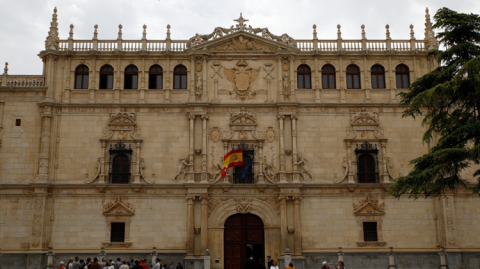Sponsored content: created in partnership with the University of Alcalá, part of the World 100 Reputation Network.
The University of Alcalá is a world leader in teaching Spanish language and culture and is home to Alcalingua, a centre dedicated to teaching Spanish to international students and training Spanish teachers. The centre’s renowned language training is complemented by academic and cultural activities thanks to its cooperation with organisations dedicated to teaching Spanish, such as the Cervantes Institute, and organisations dedicated to international students, including APUNE and the Erasmus Mundus Association.
One beneficiary of this collaboration is Armerina de Marco, an Italian student in the university’s economic sciences department, who is one of the 4,000 international students who have chosen the University of Alcalá. Like her peers, de Marco was attracted to the University of Alcalá by the quality of its education and the fact that it has more than 750 exchange agreements with universities around the world, making it home to students of many nationalities, not only studying at undergraduate or postgraduate level but also participating in international winter and summer schools, combined intensive programmes and short-term study-abroad mobilities.
“My experience at the university has been wonderful,” de Marco says. “The lessons are usually interactive, and the teachers try to include me as much as possible in their classes and make themselves available in case I don’t understand something. However, they don’t treat me differently just because I’m an Erasmus student. They demand from me what they demand from others, and that’s what I like the most because they motivate me to always do more.
“They create the feeling that I’m not different because I am not a Spanish speaker, but rather I have the ability and the right to do what everyone else does. In addition, they always try to make connections to the situation in Italy or the home countries of the other Erasmus students so that the perspectives of the rest of the class are also broadened and this exchange is fruitful for everyone on a cultural level.
“What I like most about the university is that students have the option of choosing whether to attend university in the morning or afternoon, thus enabling them to reconcile their studies with their job, if they have one.
“Another positive thing is the challenges and tasks that the teachers give us on a weekly or monthly basis so that we can approach the topic being studied in a practical way and reflect on it. The same is true for group projects that bring us closer to the business world, making us see risks and dangers in the real world and that not everything is based on theories, but depends on context.”
Cultural immersion is easy in Madrid, and Alcalá, where students can enjoy a wide range of exhibitions, shows and artistic and leisure activities, including shopping and gastronomy, which help students expand and deepen their knowledge of Spanish culture.
“I really like the joy that Spaniards transmit in general,” de Marco says. “It is very difficult to find someone who does not greet you, who does not smile at you or who does not welcome you as if you were a family member. I also like the habit of doing everything a little later than other European countries. Spaniards know how to reconcile work with fun.”
The University of Alcalá is one of the oldest universities in Europe. It is a public university based in the historic city of Alcalá de Henares, 30km from Madrid, and is spread over three campuses: the historical, the scientific-technological and the Guadalajara campus (which is 25km outside Alcalá but has an excellent transport network that links it with Alcalá and Madrid).
The university offers 40 undergraduate degrees, 78 official postgraduate studies and a wide range of continuing education programmes in all branches of knowledge. In addition, students can pursue bilingual degrees, in which at least half the credits are taught in English, or take a number of subjects from their chosen area in English.
The World 100 Reputation Network is a network of leading universities across the world.
about the University of Alcalá.

Comments